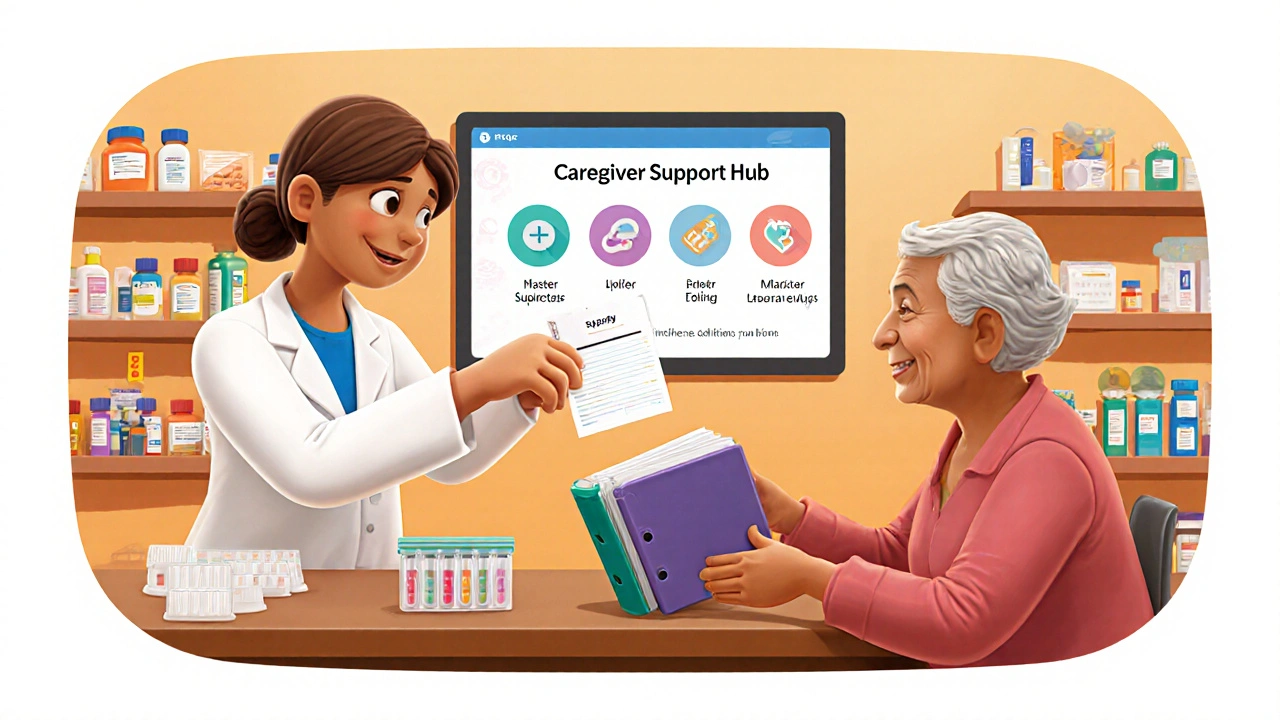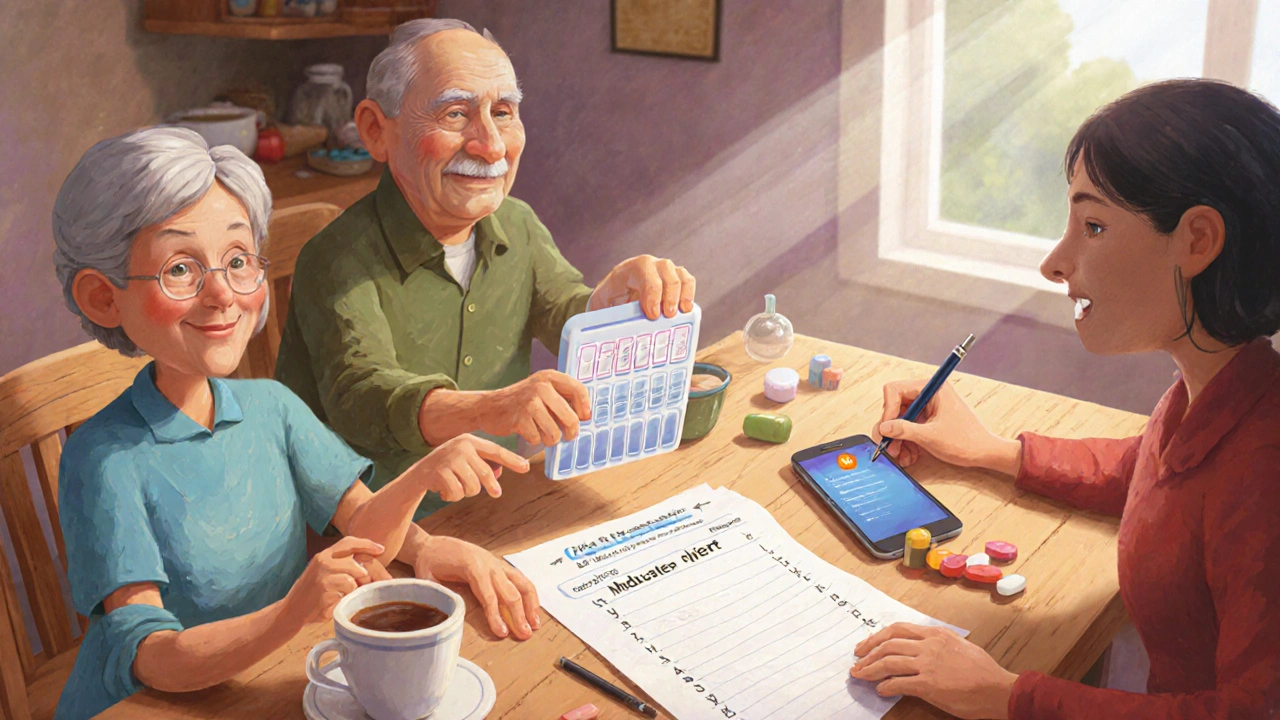When someone you love is taking multiple medications, it’s easy to assume they’re managing it all on their own. But the truth is, medication adherence is one of the biggest challenges in home healthcare-and it’s rarely solved by the patient alone. About half of all medication errors happen at home, and nearly 50% of people miss doses or take things wrong. That’s not because they’re forgetful or careless. It’s because managing pills, timing, interactions, and refills is overwhelming-even for someone who’s perfectly healthy. When you add aging, memory issues, chronic illness, or multiple doctors into the mix, it becomes impossible without help.
Why Family and Caregivers Are Essential
You don’t need to be a nurse to make a difference. Family members and unpaid caregivers are already the backbone of medication management in the U.S. According to the Caregiver Action Network, 48 million Americans help loved ones with their meds every day. And 83% of them are responsible for something: setting alarms, filling pill boxes, calling pharmacies, or watching for side effects. The impact is real. A 2023 study found that when caregivers are actively involved, missed doses drop by up to 62%. That’s not just about taking a pill on time-it’s about preventing hospital visits, avoiding dangerous drug interactions, and even saving lives. The National Council on Patient Information and Education estimates that 125,000 preventable deaths each year in the U.S. are tied to people not taking their meds correctly. That’s not a statistic. That’s someone’s parent, sibling, or grandparent.Start with the Master Medication List
The first step isn’t buying a fancy pill dispenser. It’s writing things down-accurately and completely. A master medication list is your most powerful tool. But it’s not just a note on the fridge. It needs to include every single thing the person takes, including:- Brand and generic names (e.g., Lisinopril 10mg, not just "blood pressure pill")
- Exact dosage and frequency (e.g., "Take 1 tablet at 8 AM with food")
- Reason for taking it (e.g., "for high blood pressure")
- Prescribing doctor’s name and contact info
- Known side effects or interactions
- When it was started and last reviewed
Use Tools That Actually Work
A simple pill organizer can cut errors by 37%. That’s not a guess-it’s from a 2022 study in the Journal of the American Geriatrics Society. Look for a 7-day, AM/PM version. If the person takes meds more than twice a day, consider a multi-compartment organizer with labeled sections. For people who struggle with routines or forgetfulness, electronic dispensers like Hero Health or MedMinder can be game-changers. These devices lock and unlock compartments at set times, flash lights, and send alerts to your phone. In clinical trials, they reduced missed doses by 62%. You don’t need to buy the most expensive one. Many pharmacies offer rental programs, and some insurance plans cover them if prescribed. Don’t overlook low-tech solutions. Setting alarms on a smartphone or using voice assistants like Alexa can work just as well. A 2023 University of Pittsburgh study found that voice reminders reduced missed doses by 37% for people with mild cognitive impairment. Try saying: "Alexa, remind me to take my warfarin every night at 8 PM." Then link it to an existing habit-like brushing teeth or eating breakfast. That’s called "habit stacking," and it’s endorsed by the National Institute on Aging. Linking a new habit to an old one makes it stick.Build a Routine, Not a Chore
Medication management shouldn’t feel like a full-time job. The goal is to make it automatic. Pick one time each day to do a quick check. Maybe it’s right after morning coffee or before dinner. Sit down with the pill box, the master list, and the meds. Count them. Do they match? Are any running low? Is there a new prescription you haven’t added yet? Use the "Medication Therapy Management" (MTM) service. If the person is on Medicare Part D and takes 8 or more medications for 3 or more chronic conditions, they’re eligible for free, one-on-one sessions with a pharmacist. These aren’t just refill reminders. Pharmacists review every drug for interactions, check if any are no longer needed, and explain how to take them. In 2023, 68% of eligible Medicare beneficiaries used this service-and those who did had fewer hospital visits.
Ask the Right Questions at the Pharmacy
Pharmacists are the most accessible medication experts in the U.S. Ninety-two percent of pharmacies have one on-site without an appointment. Don’t just hand over the script and walk away. Bring your master list. Ask these four questions:- What time should this be taken relative to meals?
- Are there foods, drinks, or other meds I should avoid?
- What should I do if a dose is missed?
- When should I expect to see results?
Plan for Emergencies
Not all missed doses are equal. Some meds are safe to skip a day. Others can be deadly. Create a "medication red list"-a separate note kept near the phone or in the wallet. List drugs that require immediate action if missed:- Insulin (diabetes)
- Warfarin or other blood thinners
- Heart medications like beta-blockers or digoxin
- Seizure drugs
- Steroids like prednisone
Attend Appointments Together
If you’re not already going to medical visits with your loved one, start now. A 2023 AARP survey found that 89% of caregivers who attended appointments reported better understanding of the medication plan. Doctors talk fast. They assume you know terms like "hypertension" or "renal clearance." You don’t have to. Bring your list. Ask for clarification. Take notes. Record the visit if allowed. One caregiver on Reddit wrote: "When my dad saw 4 different specialists, nobody knew what the others prescribed until I created a master list and brought it to every appointment. That’s when things finally made sense."
Watch for Burnout
Medication management is exhausting. The National Alliance for Caregiving found that 42% of caregivers say managing meds is their most stressful task. It’s not just the logistics. It’s the fear of making a mistake. If you’re feeling overwhelmed, you’re not failing-you’re human. Talk to your doctor or a social worker. Ask about respite care. Look into home health agencies that offer medication assistance. Some even send nurses to check meds once a week. And don’t feel guilty for using tech. Apps like Medisafe or Round Health send you alerts when doses are missed. They don’t replace you-they support you.What to Do When Things Go Wrong
Sometimes, despite your best efforts, things slip. A pill gets dropped. A prescription gets filled wrong. A loved one refuses to take their meds. Don’t panic. First, check the master list. Did you miss a change? Did the pharmacy give the wrong strength? Call the pharmacy immediately. They can often fix it. If the person is confused, agitated, or showing new symptoms like dizziness, rash, or confusion, call their doctor. Don’t wait. Write down exactly what happened, when, and what meds were taken. That information saves time-and possibly a life.What’s Changing Now
The system is getting better. In 2024, Walgreens launched a "Caregiver Support Hub" with dedicated pharmacists just for families. CVS Health bought Signify Health to bring medication reviews into people’s homes. The FDA has approved 12 digital pill systems since 2017. And by 2025, all electronic health records will be required to include patient-facing medication lists. But the biggest change isn’t tech-it’s attitude. More hospitals now legally must include caregivers in discharge planning. More pharmacies are training staff to speak to families, not just patients. And more families are realizing: you don’t need to be perfect. You just need to be present.Can a family member legally give someone their medication?
Yes, family members and caregivers can help administer medication as long as they’re not changing the dose, switching drugs, or giving something not prescribed. They’re not acting as medical professionals-they’re supporting the patient’s treatment plan. But they should never open sealed prescriptions or alter dosages without a doctor’s order.
What if my loved one refuses to take their meds?
Refusal is common, especially with side effects or confusion. First, talk to the doctor. Maybe the dose can be lowered, or a different drug can be tried. Don’t hide pills in food unless the doctor says it’s safe-some meds lose effectiveness or become dangerous when crushed. Use a calm, consistent approach. Remind them why they take it: "This helps you stay out of the hospital," or "It keeps your heart strong." Sometimes, linking it to a favorite activity helps: "After breakfast, we take your pills and then watch your show."
How often should I review medications with the doctor?
At least once every 6 months. For people taking 4 or more medications, quarterly reviews are recommended by the American Geriatrics Society. Each review should ask: "Is this still needed?" "Is there a safer option?" "Are any of these causing side effects?" Don’t wait for a crisis. Bring your master list and a list of concerns to every appointment.
Are pill organizers safe for all medications?
Most are, but not all. Some pills-like extended-release tablets, capsules, or those that are sensitive to moisture-shouldn’t be crushed or stored long-term in organizers. Check with the pharmacist. Also, avoid putting insulin, nitroglycerin, or liquid medications in standard pill boxes. Use a dedicated fridge-safe container for those.
Can I get help paying for medication management tools?
Yes. Many Medicare Part D plans cover electronic pill dispensers if prescribed. Some states offer grants or subsidies through Area Agencies on Aging. Nonprofits like the Caregiver Action Network and AARP have resources to help you find funding. Also, ask your pharmacy-they may have loaner programs or discounts for caregivers.
Medication support isn’t about being perfect. It’s about being consistent. It’s about showing up-not just with a pill box, but with questions, patience, and presence. You’re not just helping someone take a pill. You’re helping them stay safe, stay healthy, and stay home.

